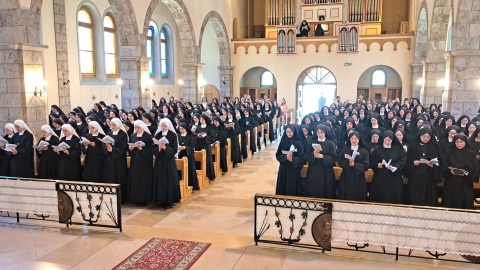Press Review: The Endless Repercussions of Fiducia Supplicans (1)

The great opposition provoked around the world by the publication of Fiducia supplicans has not prevented Pope Francis from obstinately defending this document which authorizes the blessing of couples not religiously married or of the same sex.
Pope Francis Supports Fiducia supplicans Energetically, Desperately
In the daily Italian newspaper La Stampa, on January 29, 2024, the Supreme Pontiff somewhat casually stated: “Those who protest vehemently belong to small ideological groups.
“Africans are a separate case: for them, homosexuality is something “ugly” [editor’s note: the term used in Italian is more colloquial: “gross”] from a cultural point of view; they do not tolerate it. But generally, I have confidence in the fact that, little by little, the whole world will accept the spirit of the Declaration Fiducia supplicans of the Dicastery for the Doctrine of the Faith: it wants to include, and not divide. It invites people to be welcomed, then to entrust themselves to God.”
To the question: Do you fear a schism? Francis responds: “No. There have always been small groups that protest in the Church, with schismatic thinking...We must leave them alone and pass by...and look ahead.” And he repeats what he has wanted to do with the Church since his election:
“I dream of a Church which knows how to be close to people in the concrete and nuances of daily life. I continue to think of what I said in teh General Congregations, those meetings of cardinals which precede the conclave: ‘The Church is called to go out of herself and to go toward the peripheries, not only geographicaly but also existentially: those of the mystery of sin, of suffering, of injustice, those of ignorance and absence of faith, those of thought, those of all forms of misery.’”
On January 31 in La Nuova Bussola Quotidiana, Riccardo Cascioli reacted: “in the face of the international uprising of shields, the Pope does not turn back - as requested by many - but tries to stir the pot by corroborating a clearly false narrative and insulting alleged enemies by calling them closed-hearted, not true Christians, who want to divide the Church.
“It is sad to see a pope playing a conjurer with words to advance his agenda, but one must take note of this, and also acknowledge that this is not the first time.”
The Italian journalist brings up “one point” that “deserves to be underlined: by stigmatising the African culture for which homosexuality is a 'bad' thing, Pope Francis intends to affirm [implicitly] that it is instead a 'good' thing, which is the opposite of what the Catechism of the Catholic Church states. It is therefore evident - if anyone still had doubts - that Fiducia Supplicans has as its source precisely the conviction that homosexuality is a normal variant of sexuality; and it aims to bring the whole Church to accept this view 'pastorally'.”
Despite the calm attitude that he puts on, the Pope believed himself obliged to clarify, on January 26, before the members of the Dicastery for the Doctrine of the Faith: “when a couple approaches spontaneously to ask for a blessing, one does not bless the union, but simply the people who have requested it. The union is not blessed, but the people. Of course, one must take into account the context, the sensibilities, and the place in which one lives, as well as the most appropriate way to give the blessing.”
--In plain language, we do not bless a couple of people who live together, but people who have asked for a blessing together. It is like the interreligious meeting in Assisi in 1986, where one had to understand that we “did not pray together [to Allah, Buddha, or Zoroaster],” but that we “were together to pray.”
On Marco Tosatti’s blog, on February 5, Argentine José Arturo Quarracino [nephew of the Buenos Aires cardinal whom Archbishop Bergoglio succeeded] does not mince words: “Strictly speaking, it is Pope Francis and his acolytes who make up the ‘small ideological groups’ and the ‘small groups with schismatic thinking’ in contradiction of Revelation and the Deposit of Faith entrusted to the Church.” And he vigorously denounces an abuse of power:
“This declaration had not been analyzed, discussed, or evaluated within the Dicastery of the Faith, and the bishops of the different continents had not been consulted. It was inspired by the Pontiff, written by Cardinal Fernández, and communicated to the entire universal Church as the ‘holy and revealed’ word of the Bishop of Rome, on the basis of... the words of Bergoglio,--without Holy Scripture, Apostolic Tradition, and the two millennia ecclesiastic Magisterium to support it, but only the ‘pastoral magisterium’ of Francis...”
Related Article:
(Sources : Stampa/Nuova Bussola Quotidiana/Tossati – FSSPX.Actualités)
Illustration : Conferencia Episcopal Española, CC BY-SA 2.0, via Wikimedia Commons





